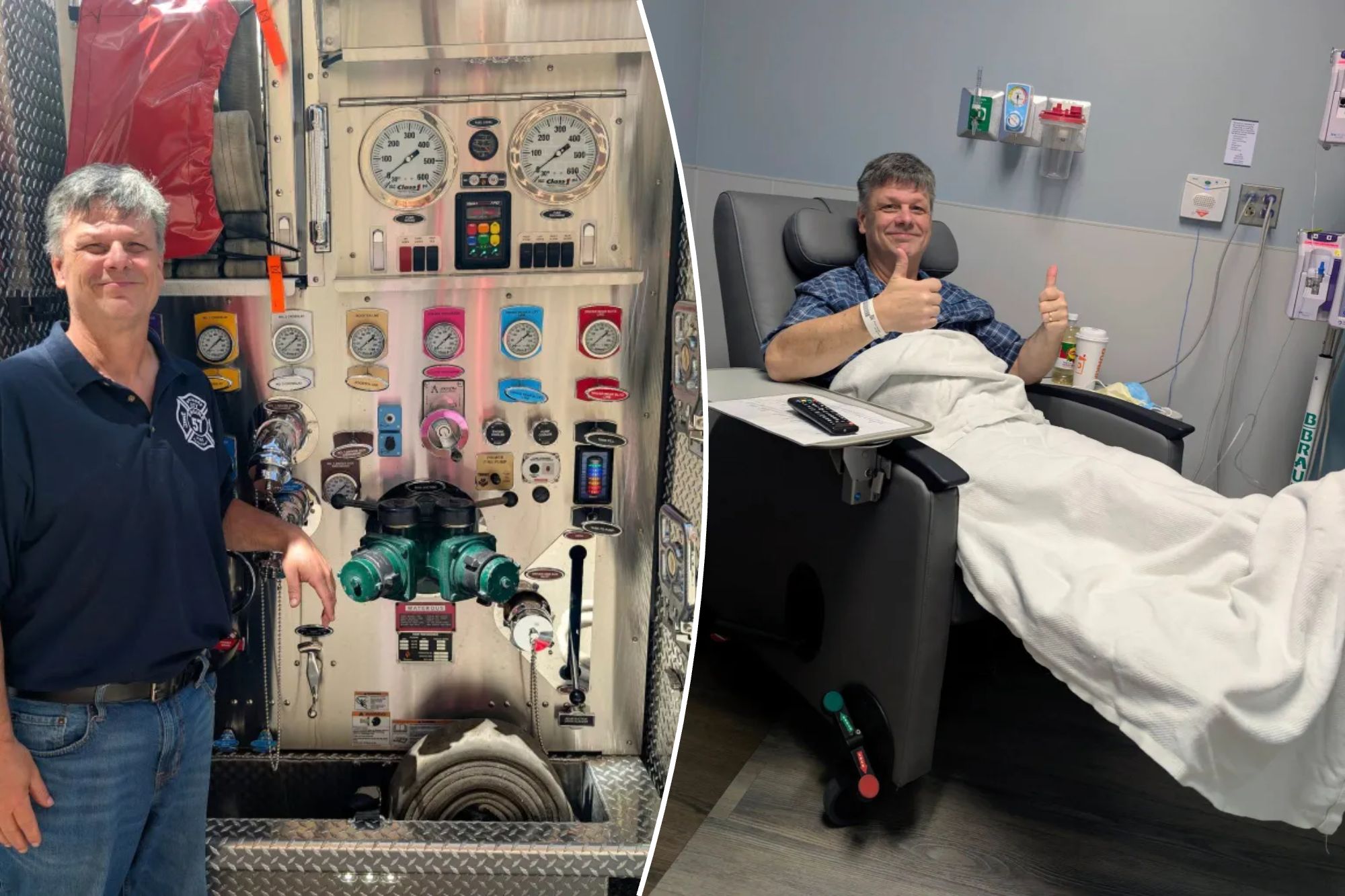
Baltimore firefighter Steve Dorssey had the worst Valentine’s Day – but he is feeling love now.
Dorsey, 56, was diagnosed on February 14 with esophagus cancer in phase 4 that spreads to its lymph nodes and liver.
The 21-year-old department veteran is on medical leave, undergoing chemotherapy in the hope of reducing his tumors as his colleagues gather around him.
“My associates in the Baltimore City Fire Department have been nothing but extraordinary and supportive,” Dorsey the Post told. “The love I’ve come out of them has been amazing.”
Esophagus cancer is an aggressive, deadly cancer that is often caught in advanced stages. The five-year survival rate is low for patients in phase 4.
Dorsey is sharing his story to encourage the first response to be proactive for their health. The father of four is also trying to get fire departments across the country to deliver the Esoguard DNA DNA Test to detect abnormal esophagus cells before progressing to cancer.
“My mission is to bring awareness of esophagus cancer [since firefighters have a] 63% higher [risk] than the general population. Right right there with testicular cancer and mesothelioma, ”Dorsey said.
“And also bring the consciousness, too, that has available tests.”
Dorsey said he underwent routine checks every six months, with high blood pressure his only concern.
Everything was okay until January when he started having trouble swallowing. The difficulties were “very benevolent” at first – sometimes he would have to drink some liquids to wash food down.
“She progressively as soon as she began to deteriorate, where it was very difficult to eat anything, in essence, without fixing it again,” Dorsey recalled.
A series of tests discovered measures in his lower esophagus, lymph nodes and liver.
Chemotherapy began in March and is expected to last in June.
“I will make a subsequent CT scan to see what the tumors look like,” Dorsey shared. “We are hopeful that they are reduced, and if chemotherapy and immunotherapies are successful in this, then we will simply continue to move forward with it.”
Meanwhile, Dorsey has made regular trips to Firehouse to see his friends.
The long pump operator, assigned to the 57 engine in Curtis Bay, lacks the company. On a recent visit, he was the first to support a new fire in Firehouse, a symbolic tradition in fire service.
“The firefighter is one of those jobs where you love the job absolutely,” Dorsey said. “I like to say that being a firefighter in Baltimore City is the best job in the world and maybe one of the worst places you can do it.”
DORSEY is a third -generation firefighter in Baltimore. He had long dreamed of being on the front lines and decided to go to him at 35 while his older son had graduated in high school.
As he knew about physical risks, he wanted to have a better understanding of long -term health risks when he joined the department in 2004.
Firefighters endure toxic chemicals, smoke, extreme heat and loud noise while saving life, increasing their risk of post-traumatic stress disorder, heart disease, respiratory diseases and certain types of cancer.
Beyond the fight against the flames, Dorsey said he was constantly exposed to oil exhaust in the Firehouse due to inadequate ventilation.
Even his defensive gear exacerbated the problem.
“When I came to the 2004 fire department, firefighters were given only a group of participation gears,” he said, mentioning that the filthy dress was once a symbol of honor.
“Changes have been made over the years. We have been released a second set of participation gears – coat and pants – and so after a fire, we actually send them inside and they are cleaned, and we move on to our second set of clothing.”
A spokesman for the Baltimore Fire Department did not return a comment request.
Dorsey said the city recently agreed that its cancer is a duty disease.
Esophagus cancer is a relatively rare cancer, which accounts for only 1% of all cancer cases in the US
The firefighter cancer support network reports that firefighters have an increased 39% risk of death from esophagus cancer.
Lucid diagnostics, based in Manhattan, hopes to capture cancer before it develops.
Esoguard is a non-invasive test that uses a swallowing capsule to collect cells from the lower esophagus for analysis.
The test, which started commercially in 2019, requires genetic markers associated with Barrett’s esophagus and adenocarcinoma of the esophagus (cancer).
“Many fire departments across the country are partnership with Esoguard to offer this testing to their members. The city of Baltimore was not one,” Dorsey said.
Lucid said he examined over 10,000 firefighters. In New York, she has developed small events with FDNY.
“We are engaged with the WTC Foundation of September 11 to add it as a covered benefit, but we currently do not have an active policy,” Lucid The Post told.
“We remain optimistic for clinics to see the value for this high -risk group and we will be able to fully apply it to NYC WTC in the coming months.”
As he spreads the awareness of the importance of cancer manifestations, Dorsel is being celebrated by his community for its influence and resistance.
Two funds are scheduled for summer to help pay Dorey’s medical expenses. Over $ 9,700 are raised through Gofundme.
Eventually, his ill rest will become a medical retirement. The grandfather of five had planned to retire in six or seven years – not like this.
“I didn’t expect it to happen this early or to happen that way,” Dorsey said. But as he reflected in his career, he noted that “it was a great journey.”
#Firefighter #fighting #phase #cancer #symptom #benign
Image Source : nypost.com